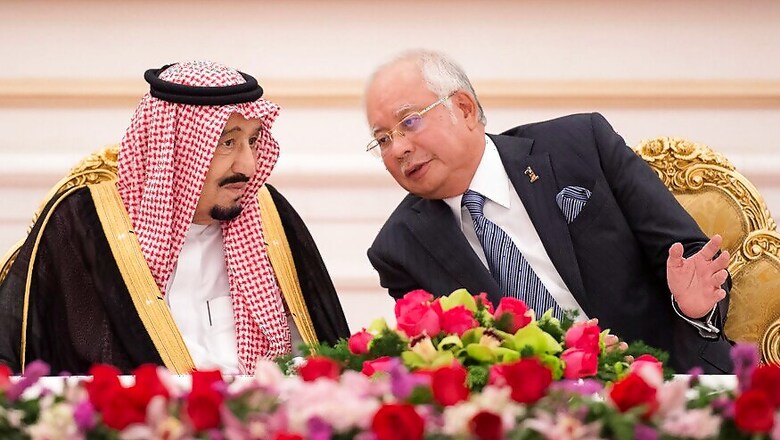
views
Kuala Lumpur: Malaysia’s growing ties to Saudi Arabia - and its puritan Salafi-Wahhabi Islamic doctrines - are coming under new scrutiny as concerns grow over an erosion of traditional religious practices and culture in the multi-ethnic nation.
A string of recent events has fuelled the concern. Hostility toward atheists, non-believers and the gay community has risen. Two annual beer festivals were cancelled after Islamic leaders objected. A hardline preacher, accused of spreading hatred in India, has received official patronage.
The government has backed a parliamentary bill that would allow harsh sharia punishments, such as amputations for theft and stoning for adultery. And after religious officials supported a Muslim-only laundromat, Malaysia's mostly ceremonial royalty made a rare public intervention, calling for religious harmony.
Marina Mahathir, the daughter of Malaysia's longest serving prime minister, Mahathir Mohamad, publicly lashed out at the government for allowing the "Arabisation" of Malaysia.
Marina, who heads the civil rights group Sisters in Islam, told Reuters Saudi influence on Islam in Malaysia "has come at the expense of traditional Malay culture". Her father, 93, now heads the opposition alliance.
Saudi Arabia’s fundamentalist Wahhabi beliefs have strongly influenced Malaysia – and neighbouring Indonesia - for decades, but have strengthened considerably since Najib became prime minister in 2009 and began cosying up to the kingdom.
The relationship came under a harsh spotlight when nearly $700 million wound up in Najib's bank account in 2013. Najib said it was a donation from the Saudi Royal family, rebutting allegations it was money siphoned from the 1MDB state investment fund he had founded and overseen. Malaysia's attorney-general cleared him of any wrongdoing.
The trend toward a politicised brand of Islam in Malaysia, a middle-income emerging market, has alarmed Malaysia’s non-Muslims, including ethnic Chinese who comprise a quarter of the population and dominate private sector commerce. It is also a concern for foreign investors, who account for nearly half the local bond market and have invested $8.95 billion in project investments in the first nine months of this year.
The government denies actively promoting Wahhabi-style Islamic conservatism.
Najib has been largely silent about the recent religious controversies. Critics have accused the prime minister, whose governing coalition lost the popular vote in the last general election but retained a simple majority in parliament, of playing on fears that Islam and Malay political power will be eroded should the opposition win. An election is due by mid-2018.
ELECTION CALCULATIONS
Militancy has also been on the rise in Malaysia, which from 2013 to 2016 had arrested more than 250 people with alleged ties to Islamic State, many of whom were indoctrinated with hardline interpretations of Islam.
After the visit of the Saudi monarch this year, Malaysia announced plans to build the King Salman Centre for International Peace to bring together Islamic scholars and intelligence agencies in an effort to counter extremist interpretations of Islam.
The centre, which is being built on a 16-hectare (40-acre) plot in the administrative capital of Putrajaya, will draw on the resources of the Saudi-financed Islamic Science University of Malaysia, and the Muslim World League, a Wahhabi Saudi religious body.
Saudi Arabia has long been funding mosques and schools in Malaysia, while providing scholarships for Malaysians to study in the kingdom. Many of them find employment in Malaysia's multitude of Islamic agencies, said Farouk Musa, chairman and director of the moderate think-tank, Islamic Renaissance Front.
One of the most worrisome doctrines they preach in multi-cultural Malaysia is 'al-w ala' wa-al-bara' or "allegiance and disavowal", Farouk said. "This doctrine basically means do not befriend the non-believers (al-kuffar), even if they are among the closest relatives.
"We have never heard of Islamic scholars forbidding Muslims to wish Merry Christmas before, for example. Now, this is a common phenomenon,” he said.
The adoption of Arab culture and interpretations of Islam is a result of greater exposure to Middle Eastern people and universities, said Abdul Aziz Kaprawi, a member of the Supreme Council of Najib’s political party, the United Malay National Organisation.
"The extensive usage of social media also accelerated the external influence on the locals," he told Reuters.
The government is not promoting Wahhabism but rather the doctrine of "wasatiyyah", or moderation and balance, to accommodate Malaysia's multi-cultural society, said Abdul Aziz, who is also a federal deputy minister.
CROWN PRINCE'S REFORMS?
Karima Bennoune, the United Nations Special Rapporteur for cultural rights, expressed concern in a report after her September visit to Malaysia about the deepening involvement of religious authorities in policy decisions. She said this was influenced by “a hegemonic version of Islam imported from the Arabian Peninsula” that was “at odds with local forms of practice.”
She also expressed concern about "the banning of books, including some about moderate and progressive Islam, in the country when the government extols these very concepts abroad".
Marina Mahathir said religious departments, staffed with Saudi graduates, "are now consulted on absolutely everything, from movies to health and medicine to insurance, all sorts of things that they do not necessarily have any expertise in".
The kingdom also exerts leverage over Muslim-majority countries such as Indonesia and Malaysia through the quotas it gives to countries for the number of pilgrims they can send on the Hajj, one of the five pillars of Islam that all capable Muslims must perform at least once in their lives.
This could all start to change if Saudi Arabia's powerful Crown Prince Mohammed bin Salman succeeds in returning the Saudi kingdom to “a moderate Islam,” which he says was practiced before 1979.
He has already scaled back the role of religious police, permitted public concerts and announced women will be allowed to drive.
The kingdom has also set up an authority to scrutinize uses of the “hadith” – accounts of the sayings, actions or habits of the Prophet – to prevent them being used to justify violence or terrorism.

















Comments
0 comment